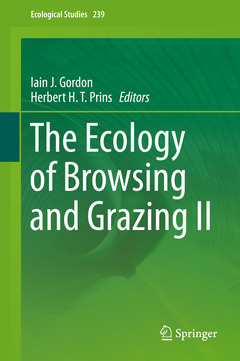The Ecology of Browsing and Grazing II, 1st ed. 2019 Ecological Studies Series, Vol. 239
Coordonnateurs : Gordon Iain J., Prins Herbert H. T.

Domestic and wild large mammalian herbivores occur on every continent except Antarctica. Through their browsing and grazing, they affect the structure and distribution not only of vegetation, but also of associated fauna. Consequently, the interactions between management practices and herbivore populations influence the biodiversity, structure and dynamics of ecosystems across vast expanses around the globe: signs of human activity that will be detectable for epochs to come.
As a follow-up work to The Ecology of Browsing and Grazing, published in 2008, this new volume presents cutting-edge research on the behaviour, distribution, movement, and direct and indirect impacts of domestic and wild herbivores on terrestrial ecosystems. The respective chapters highlight strategic and applied research on cross-cutting issues in palaeontology and ecology, and provide concrete recommendations on the management of large herbivores to integrate production andconservation in terrestrial systems. Given its scope, the book will appeal to students, researchers and anyone interested in understanding these fascinating wild animals and how they shape the natural world.
Chapter 1. The Ecology of Browsing and Grazing II.- Chapter 2. The palaeontology of browsing and grazing.- Chapter 3. The paleoecological impact of grazing and browsing: consequences of the late Quaternary large herbivore extinctions.- Chapter 4. Morphological and Physiological Adaptations for Browsing and Grazing.- Chapter 5. Feeding ecology of large browsing and grazing herbivores.- Chapter 6. Population dynamics of browsing and grazing ungulates in the Anthropocene.- Chapter 7. Community dynamics of browsing and grazing ungulates.- Chapter 8. Weather and Climate Impacts on Browsing and Grazing Ungulates.- Chapter 9. Impacts of browsing and grazing ungulates on soil biota and nutrient dynamics.- Chapter 10. Effects of grazing and browsing on tropical savanna vegetation.- Chapter 11. Impacts of browsing and grazing ungulates on plant characteristics and dynamics.- Chapter 12. Impacts of browsing and grazing ungulates on faunalbiodiversity.- Chapter 13. Interactions between fire and herbivory: current un-derstanding and management implications.- Chapter 14. Managing Browsing and Grazing ungulates.- Chapter 15. The ecology of browsing and grazing in other vertebrate taxa.- Chapter 16. Browsers and grazers drive the dynamics of ecosystems.
Professor Iain Gordon is the Deputy Vice-Chancellor, Division of Tropical Environments and Societies, at James Cook University, Townsville, Australia. He received his Bachelor of Science Degree from the University of Aberdeen in 1981 and his PhD from the University of Cambridge in 1986. He was awarded an Honorary DSc by the University of Abertay in 2013. Throughout his career, which spans research, research management and provision of policy advice, Professor Gordon has played an active role in promoting the value of biodiversity and its importance in the provision of ecosystem services and human wellbeing. Over the past 25 years, he has gained an international reputation for scientific leadership and research excellence in interdisciplinary approaches, particularly in the context of managing land use to promote biodiversity. In recognition of his contributions to science, he was elected as a Fellow of the Royal Society of Biology in 1995 and Fellow of the RoyalSociety of Edinburgh in 2012.
Professor Herbert H.T. Prins is an Emeritus Professor of Resource Ecology at Wageningen University, the Netherlands. At Cambridge (UK), Professor Tim Clutton-Brock was his doctoral supervisor. He was Fulbright Scholar and Visiting Professor at Princeton University (USA), the Commonwealth Scientific and Industrial Research Organization, (Australia), University of Natal (South Africa), Foundation Fellow and Visiting Professor at the Royal Melbourne Institute of Technology (Australia) and an Honorary Professor of Computational Ecology at the University of KwaZulu-Natal (South Africa). He has received the Aldo Leopold Award, was appointed an Officer in the Order of Oranje Nassau by Royal Decree of HM The Queen Beatrix, and an Officer in the Order of the Golden Ark, bestowed by HRH Prince Bernhard. He has (co-)authored nearly 500 publications, co-edited 12 books, written one book on African buffalo, and has supervised 99 PhD students from all aroun
Date de parution : 11-2020
Ouvrage de 451 p.
15.5x23.5 cm
Date de parution : 11-2019
Ouvrage de 451 p.
15.5x23.5 cm



